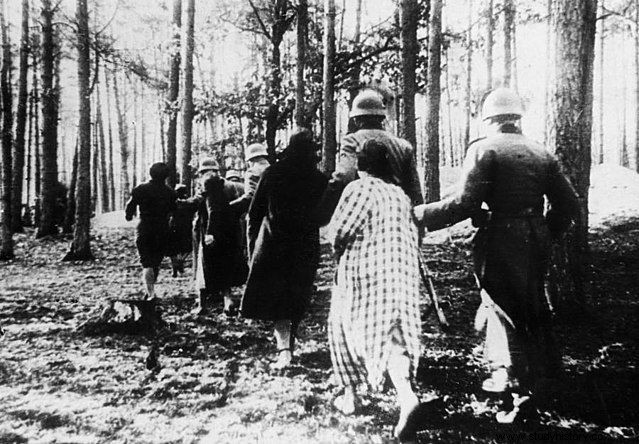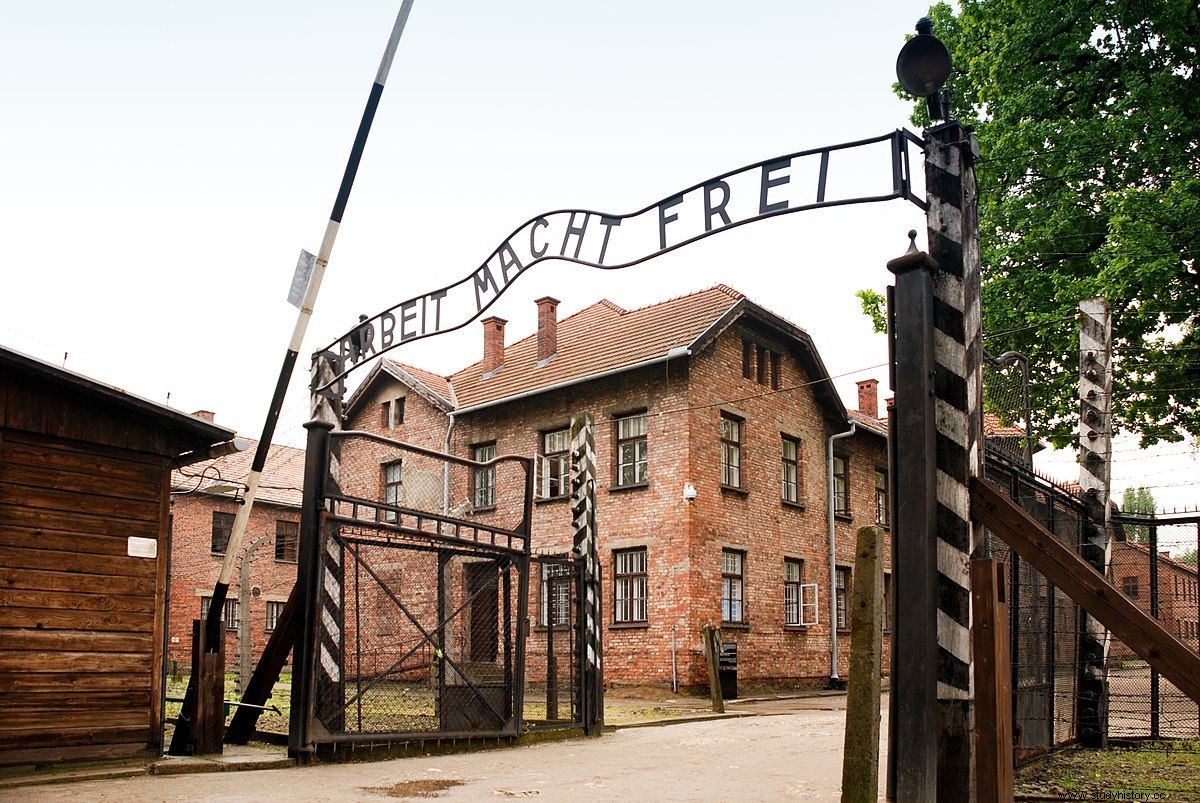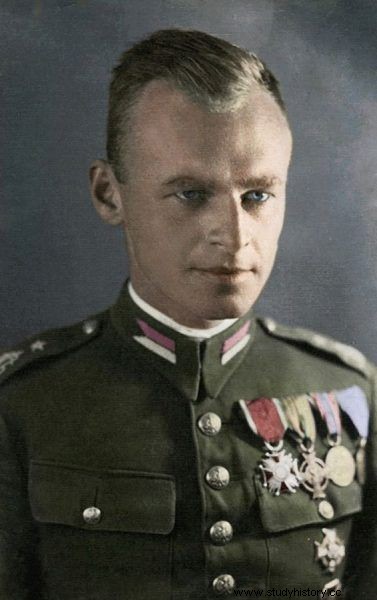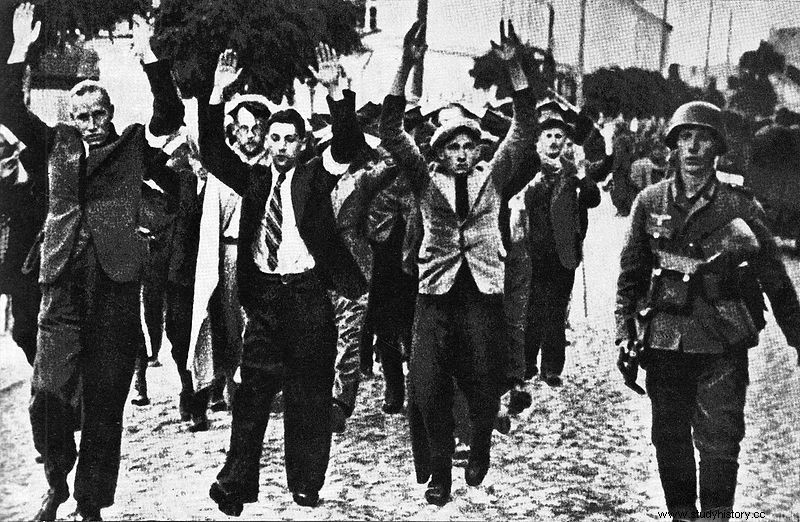On May 10, Nazi troops entered Luxembourg, Belgium and the Netherlands, heading straight into the very heart of France. This was the moment the entire Polish underground was waiting for. The combined forces of the Allies were to be a power that would crush the attacker and either defeat the Third Reich, or distract the Nazis enough to be able to think about preparing an uprising in Poland.
Jan's mother installed an illegal radio in her apartment. They gathered around him in a larger group. Good news was eagerly awaited at first, but news from the front caused more and more sorrow over time. The BBC reported that the German army had routed the British at Dunkirk and entered Paris. It soon became clear that Germany would quickly complete its destruction, and that the campaign in the west of the continent would end in total disaster for the French. This meant that the war could go on for a very long time.
Governor Hans Frank, who in this situation said that he no longer had to worry about how the international community and foreign media would react to his actions, ordered mass arrests of men of draft age. On June 20, 1940, three hundred and fifty-eight representatives of the Polish elite were shot in Palmiry.
Mass arrests
Thousands of Poles from the General Government were deported to concentration camps in Germany. One day Witold avoided arrest at the last minute when SS men raided Eleanor's apartment. He heard the trucks and only had enough time to stash the papers in a hiding place under the floor and sneak out the back door before the gendarmes burst in. Later, he hid in various places, using documents issued in the name of Tomasz Serafiński.
The intensified repression of the occupiers led to a series of arrests of members of the network organized by Witold. In just one day, the Gestapo arrested most of the Bodega's staff and waiters. New employees were quickly hired, but this time the Gestapo managed to place a spy among them . It was a young, reckless Polish woman in love with a German officer, who gave the SS several names, including those belonging to one of Witold's friends - gynecologist Władysław Dering, who was also her uncle. On July 3, 1940, just before dawn, the SS men pulled Dering and his wife out of the apartment.

On June 20, 1940, three hundred and fifty-eight representatives of the Polish elite were shot in Palmiry.
The members of the underground did not know what actually happened to Dering, but had heard news of the establishment of an SS concentration camp in June in the former military barracks located in Oświęcim, away from the city center. After its incorporation into the Reich, its name was changed to Auschwitz. Such camps had already become a symbol of the new order in the Third Reich since Hitler came to power. Under Hitler's Emergency Decree, the law permitted indefinite arrest as a "precautionary measure" that could be applied to any citizen considered by the SS to be an enemy of the state. From the beginning of the war, the Nazis threw thousands of politicians, left-wing activists, Jews, homosexuals and others accused of the so-called social deviation.
It was not the Nazis who pioneered the concept of eliminating political opponents in this way, but Auschwitz was distinguished by the fact that it was the first German camp to which people were sent according to nationality - in this case it was about Poles. In the first period of the camp's existence, the Germans did not distinguish the ethnic origin of the Poles imprisoned there - mostly Catholics, but among the first prisoners there were also Jews and people of German nationality.
Infiltrate Auschwitz
The underground army did not have very detailed knowledge of Auschwitz at that time. The leaders of the organization noticed, however, that the Germans were sending more and more people to the camp. Until August 1940, over a thousand people were imprisoned there. Letters from Auschwitz prisoners also did not contain significant information. However, the number of notifications sent by the camp administration to the families of deceased prisoners was disturbing. And the scale of violence was evidenced by, for example, personal belongings sent back to relatives, which sometimes bore traces of blood.
A few weeks later, i.e. in August 1940, Władysław Surmacki, the Chief of Staff of the Polish Secret Army, was arrested. Therefore, Jan Włodarkiewicz called an extraordinary meeting of the organization's command in Jadwiga Tereszczenko's apartment. The atmosphere in the room was nervous, the air thick with cigarette smoke. When Jan asked for attention, he began by announcing the merger of TAP with the mainstream underground organization that Witold insisted on.

In 1940, the underground army did not have very detailed knowledge of Auschwitz.
In the air you could clearly feel the mutual dislike of Witold and Jan, who addressed his old friend with the words:"You have met an honor".
He explained that the topic of the camp had been raised in conversations with Rowecki. The head of the ZWZ believed that until it was possible to find out what was actually happening in this mysterious place, the Germans would get away with everything. He needed someone who could infiltrate the camp, collect data and, if possible, create a resistance cell in Auschwitz, and then organize an escape.
"I mentioned your name with Grot as the only officer who will do it," explained Jan.
Witold accepted these words calmly, although he had a hard time hiding his emotions. He knew that in this way he was punished for refusing to support the ideological and political manifesto of the TAP. But he wasn't going to give him satisfaction. In the following words, Jan explained that, as his informant in the navy blue police reported, the Germans were planning a large round-up in the coming days. The SS has set itself the goal of sending to Auschwitz every educated Pole, or anyone who looks like an intellectual. There was an opportunity to get into the camp, although those suspected of working in the underground were probably shot immediately.
Under these circumstances, Jan could not order Witold to perform such a task. He was counting on volunteering.
A volunteer?
Witold analyzed his chances. A conscious decision to avoid a German round-up seemed pure madness. Even if the Germans did not shoot him right away, he could be interrogated and exposed. And what will happen to him once he is in Auschwitz? If the conditions in the camp were as harsh as the underground suspected, his chances of setting up a resistance network and organizing a rebellion there seemed almost to be nil. On the other hand, if the camp is just an ordinary internment center, it could turn out to be spent months in captivity, simply wasting its time, while everything important will be happening in Warsaw.
He analyzed the level of risk and costs associated with the fact that he had persuaded Jan to accept Rowecki's leadership. What would it look like if he refused to perform the first task commissioned directly by Rowecki? He is trapped.
He asked for time to think. For several days he wondered what to do. In his later written memoirs, Witold does not speak of fear for his own safety, which does not change the fact that he was certainly worried about the fate of his family. Maria accepted the thought that she was active in the underground and was in Warsaw. From time to time, Witold came to Ostrów Mazowiecka. Still, they were only a short distance away, and he would have reacted if anything bad happened to her or the children. While in Auschwitz, he could not help them anymore. And if his true identity were discovered, he could expose his family to Nazi repression.

Witold Pilecki in Polish uniform
Round-ups mentioned by Jan Włodarkiewicz began on August 12, 1940. At that time, the SS, with the help of the navy blue police, set up blockades on the main thoroughfares in the city center. Men of recruiting age who could serve in the Polish army during the September campaign were taken straight from the streets and apartments. "Of course, the operation was not particularly delicately conducted," noted Ludwik Landau in his memoirs. “Trams were stopped with bayonets in position, threatening to use them in the event of an escape attempt; reportedly two people were killed while trying to sneak out, one with a bayonet, the other shot ".
More than 1,500 men were arrested that afternoon. Witold wondered about the feasibility of the task, not sharing his conclusions with anyone. "He did not like to come out with his thoughts, he often silenced matters which he considered to be beyond discussion," recalled Eleanor. - I did not ask for details, […] I knew that this work requires strict secrecy. ”
A few days later, another meeting between Witold and Jan took place. Then the commandant of TAP gave him the confirmed information:Dering and Surmacki were sent to Auschwitz. "You see, you missed such a good opportunity," said Jan sardonically.
Witold's answer was not noticed by any of the participants of those events. The awareness that his colleagues are in the camp may have been the decisive factor that convinced Witold to put aside any fears and accept the mission . He had been friends with Dering since the Bolshevik campaign, and Surmacki was his neighbor from the Lida area.
Final decision
He told John that he was ready to undertake this mission. A few weeks later, the Germans were to conduct another mass roundup in Żoliborz. Pilecki planned that thanks to her he would go to Auschwitz. With the handle clicked, there was nothing else to do but to deal with the practicalities of preparing for the arrest. Witold handed over his duties to other underground officers. He spent some time with Maria and the children. He decided not to tell her about his mission. He decided that it would be better if she did not have to pretend to be ignorant if she were questioned by the Gestapo. All she knew was that he had been selected for an important mission and that he had once again put the country's good before his family.
On September 18 Witold packed some things into a backpack and went to Eleanor's apartment. He expected the Germans to check them during a round-up that was to take place the next morning. Together with their sister-in-law and still little nephew, Marek, they ate something like their last meal together. When the boy went to sleep in the next room in the evening, Vytautas seemed calm. He thoroughly checked the apartment to make sure there were no incriminating documents.

Round-up victims in Warsaw
They went over the whole plan again. If he was sent to the camp, Eleanor was to be a contact person and conveyed to Jan the information gathered in the camp intended for the officers of the underground leadership. Had he been exposed, Eleanor would have quickly found herself with the Gestapo. She was aware of the risks. And yet she seemed even more determined than Witold. Her posture must have reassured him as he lay down to sleep on the couch in the living room. He hoped that if he pretended to be Tomasz Serafiński, whose papers he had at his disposal, he would keep the family safe.
On September 19, he woke up early in the morning and dressed quickly. He didn't have to wait long to hear the engines roar of approaching trucks. A few moments later he heard a pounding on the door. Eleanor opened it, also dressed and ready to act. Behind the door stood nervous and concerned Jan Kilianski, the building's caretaker, who came to warn them about the round-up.
- Mr. Jan, thank you - Witold reassured him.
Witold went to the bedroom that Eleanor shared with Marek. The boy stood in his crib, eyes wide with amazement. They could clearly hear the tumult, crackling and screams of the German soldiers now. Then he noticed Mark's favorite teddy bear lying on the floor. He bent down to pick it up and hand it to the baby. The boy was scared, but he understood intuitively that he should not cry. The front door to the building slammed. On the concrete steps, you could hear the clatter of shod boots, and then screams.
Then Kilianski appeared again.
- They are already in the building. This is your last chance.
Witold thanked him once again. The caretaker left.
After a short while the Germans were knocking on the door of Eleanor's apartment. A soldier burst in, waving his weapon.
- Get up, move! He shouted. Witold was already wearing a jacket and instead of running away, he calmly headed towards the soldier.
He whispered to Eleanor again:
- Report that I have fulfilled the order.
The stairs were swarming with soldiers and Gestapo men. They escorted those arrested to the street. It was dawn. Among those gathered, Witold recognized the sticky neighbor Sławek Szpakowski. At least a hundred men were arrested. Some had bags and coats with them, as if they were getting ready for some business trip. Others were walking barefoot still in their pajamas.
Then the Germans ordered the men to form a column and led the arrested people towards Wilson Square, about a kilometer away. On the spot, the soldiers checked the documents. Those who were deemed necessary to the war effort of the Third Reich, workers, railroad workers and the like, were released. The rest went to covered trucks. Witold found himself in the latter group. He hopped onto the truck's crate as the engines came to life.
Source:
- The article is an excerpt from the book Ochotnik. The true story of Witold Pilecki's secret mission . Ochotnik is the long-awaited story of Witold Pilecki, which will be released on September 2, 2020 by Znak Horyzont Publishing House in cooperation with the Pilecki Institute. The book is held under the patronage of Historical Curiosities
